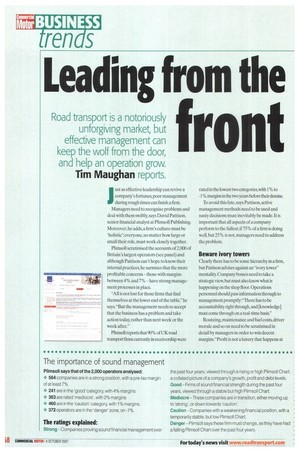Leading from the
Page 58

Page 59

If you've noticed an error in this article please click here to report it so we can fix it.
front
Road transport is a notoriously unforgiving market, but effective management can keep the wolf from the door, and help an operation grow.
Tim Maughan reports.
Iust as effective leadership can revive a company's fortunes, poor management during rough times can finish a firm. Managers need to recognise problems and deal with them swiftly, says David Pattison, senior financial analyst at Plimsoll Publishing. Moreover,he adds, a firm's culture must be 'holistic': everyone, no matter how large or small their role, must work closely together.
Plimsoll scrutinised the accounts of 2,000 of Britain's largest operators (see panel) and although Pattison can't hope to know their internal practices,he surmises that the more profitable concerns — those with margins between 4% and 7% — have strong management processes in place.
"All is not lost for those firms that find themselves at the lower end of the table," he says. "But the management needs to accept that the business has a problem and take action today, rather than next week or the week after."
Plimsoll reports that 90% of UK road transport firms currently in receivership were rated in the lowest two categories, with 1% to -1% margins in the two years before their demise.
To avoid this fate, says Pattison, active management methods need to be used and nasty decisions must inevitably be made. It is important that all aspects of a company perform to the fullest; if 75% of a firrn is doing well, but 25% is not, managers need to address the problem.
Beware ivory towers
Clearly there has to be some hierarchy in a firm, but Pattison advises against an "ivory tower" mentality. Company bosses need to take a strategic view, but must also know what is happening on the shop floor. Operations personnel should pass information through to management promptly: "There has to be accountability right through, and [knowledge] must come through on a real-time basis."
Routeing,maintenance and fuel costs, driver morale and so on need to be scrutinised in detail by managers in order to win decent margina"Profit is not a luxury that happens at the end of the year," says Pattison."It is the engine room of the business."
Lincoln-based DenbyTransport turns over in the region of E9-10m a year. Director Dick Denby says the firm enjoys a "good and solid margin".The formula for success, he believes, is to allow quality staff -"a lorry driver is almost like a foreman"to get on with the job, while the management team deals with the bigger picture. Each element is vital to the other. Like Pattison, he asserts that effective managers allow their personnel to breathe, while at the same time taking stock of running costs, current business and planning for the future. He says managing director Peter Denby examines overheads and, specifically, revenue per mile on a monthly basis.
From there, profit can be gauged. "You have got to have management with forethought," he says. •


























































































































































































